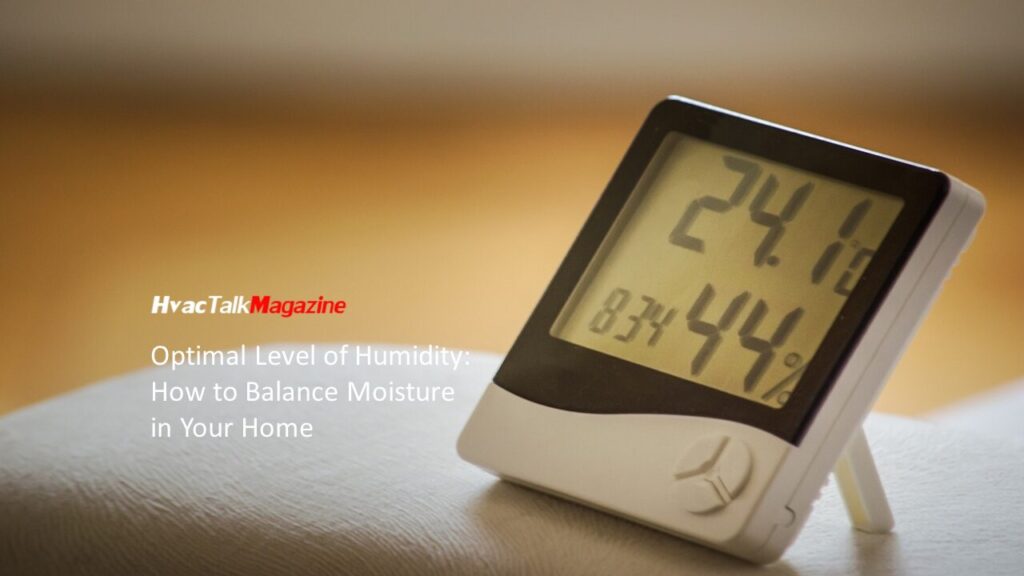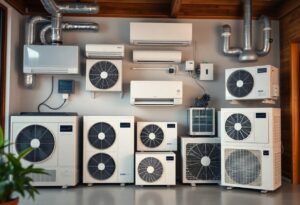Optimal Level of Humidity: How to Balance Moisture in Your Home
Maintaining the right level of humidity in your home is crucial for comfort, health, and indoor air quality. Both excessive and insufficient humidity can cause a range of problems, from respiratory issues to structural damage. In this blog post, we will explore the optimal level of humidity for your home, explain why people use humidifiers, and highlight the benefits of maintaining proper humidity levels.
What is the Level of Humidity that Should Be Present Inside a House?
The ideal indoor level of humidity generally ranges from 30% to 50%. Here’s why maintaining this range is crucial:
- Comfort: A level of Humidity within this range helps maintain a comfortable living environment, preventing the air from feeling too dry or too damp.
- Health: Proper level of humidity reduces the risk of respiratory issues, allergies, and the spread of airborne viruses.
- Preservation: A balanced level of humidity protects your home’s structure and furnishings, preventing mold growth, wood warping, and paint peeling.
Why Do People Use Humidifiers in Their Homes?
Humidifiers are devices that add moisture to the air, helping to maintain the optimal level of humidity, especially during dry seasons. Here are some reasons why people use humidifiers:
1. Alleviate Dry Skin and Irritation
Dry indoor air can cause the skin to become dry, itchy, and irritated. Humidifiers help to keep the skin hydrated, reducing discomfort and preventing conditions like eczema from worsening.
2. Improve Respiratory Health
Dry air can irritate the respiratory tract, leading to coughing, nosebleeds, and dry throat. Humidifiers add moisture to the air, making it easier to breathe and reducing the likelihood of respiratory issues.
3. Prevent Static Electricity
Dry air increases static electricity, which can be annoying and potentially damaging to electronic devices. By adding moisture to the air, humidifiers help reduce static buildup.
4. Preserve Wood Furniture and Instruments
Low humidity can cause wood to crack and warp. Using a humidifier helps maintain the moisture balance, protecting wood furniture and musical instruments.
5. Enhance Indoor Plant Health
Many indoor plants thrive in environments with higher humidity. Humidifiers can create a more suitable atmosphere for houseplants, promoting their growth and health.
Tip of the Day
Achieve the perfect balance of moisture in your home with our guide on optimal humidity levels! Learn how to maintain a healthy and comfortable environment year-round.
👉 Read now and discover tips for managing humidity in your home. Enhance your comfort and protect your home from excess moisture today!
Benefits of Having Humidity Inside Your House
Maintaining a proper level of humidity in your home offers numerous benefits:
1. Health Benefits
- Reduced Risk of Illness: A proper level of humidity can reduce the spread of airborne viruses and bacteria, lowering the risk of infections.
- Allergy Relief: Humid air can help alleviate allergy symptoms by keeping nasal passages moist and reducing the presence of allergens.
- Improved Sleep: A comfortable humidity level can improve sleep quality by reducing dryness and irritation in the throat and nasal passages.
2. Comfort and Well-being
- Enhanced Comfort: Balanced humidity levels prevent the air from feeling too dry or too damp, creating a more comfortable living environment.
- Better Temperature Regulation: Humid air can make your home feel warmer in winter and cooler in summer, enhancing overall comfort.
3. Home Preservation
- Protection Against Mold and Mildew: Proper humidity levels prevent excess moisture, reducing the risk of mold and mildew growth.
- Preservation of Furnishings: Balanced humidity protects wood furniture, musical instruments, and other household items from cracking and warping.
- Energy Efficiency: Maintaining proper humidity levels can improve the efficiency of your heating and cooling systems, potentially reducing energy costs.
Tips for Balancing Humidity in Your Home
1. Use Humidifiers and Dehumidifiers
- Humidifiers: These devices add moisture to the air and are particularly useful during the winter months when indoor air tends to be dry. Place humidifiers in key areas like bedrooms and living rooms.
- Dehumidifiers: These devices remove excess moisture from the air, making them ideal for damp areas like basements and bathrooms. Consider using a dehumidifier if you notice condensation on windows or a musty smell.
2. Ventilation
Proper ventilation is key to maintaining optimal humidity levels:
- Exhaust Fans: Use exhaust fans in kitchens and bathrooms to remove excess moisture generated from cooking and bathing.
- Open Windows: When weather permits, open windows to allow fresh air to circulate and reduce indoor humidity.
- Attic and Basement Ventilation: Ensure your attic and basement are well-ventilated to prevent moisture buildup.
3. Air Conditioning and Heating
Your HVAC system plays a significant role in controlling indoor humidity:
- Air Conditioners: Besides cooling, air conditioners help to dehumidify the air. Ensure your AC unit is properly sized and maintained for optimal performance.
- Heaters: During the winter, central heating can dry out the air. Use a humidifier in conjunction with your heating system to maintain balanced humidity levels.
4. Moisture Control Practices
Adopt practices that help control moisture in your home:
- Fix Leaks: Repair any plumbing leaks promptly to prevent water damage and mold growth.
- Insulate: Proper insulation can prevent condensation and moisture buildup on walls and ceilings.
- Houseplants: Certain houseplants, like peace lilies and ferns, can help regulate indoor humidity by absorbing moisture from the air.
5. Regular Maintenance
Routine maintenance of your home and HVAC system is crucial for controlling humidity:
- Clean Gutters: Ensure gutters are clean and direct water away from your home’s foundation to prevent moisture problems.
- Inspect and Clean HVAC System: Regularly inspect and clean your HVAC system, including changing filters, to ensure it’s functioning correctly.
Looking for Jobs in HVAC-R and Plumbing or Post #HvacJobsCenter
Conclusion
Maintaining the optimal level of humidity in your home is essential for your comfort, health, and the longevity of your home’s structure. By understanding the importance of proper humidity levels, measuring them accurately, and implementing practical solutions like using humidifiers, dehumidifiers, and proper ventilation, you can create a healthier and more comfortable living environment. Regular maintenance and mindful practices will help you achieve and maintain the perfect balance of moisture in your home, ensuring a safe and pleasant atmosphere for you and your family.
Follow Us on Google Chrome
- To get started, switch to Google Chrome Browser
- Already on our site
- Top right, tap the 3 dots
- Bottom right, tap follow
- You are done.
Learn more and join our mailing list for updates.
This post has been written by Team HVAC Talk Magazine. Stay informed and connected with the latest in HVAC—join us for expert advice, troubleshooting tips, and news updates. Don’t miss out, follow us now! #HVACExperts #HVACTips #StayInformed #HVACProTalk








